Making Public Health Personal is a podcast brought to you by CUNY SPH. Each episode focuses on an aspect of health and social justice that affects our daily lives. Learn from CUNY SPH’s expert faculty, researchers, alumni and students on how public health policy, advocacy and practices can benefit our ever-evolving community, and our world. You don’t have to work in healthcare or have a PhD to understand these topics. We break them down for you and give you practical tips to make a difference, big or small.
Making Public Health Personal
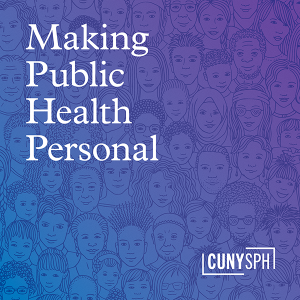
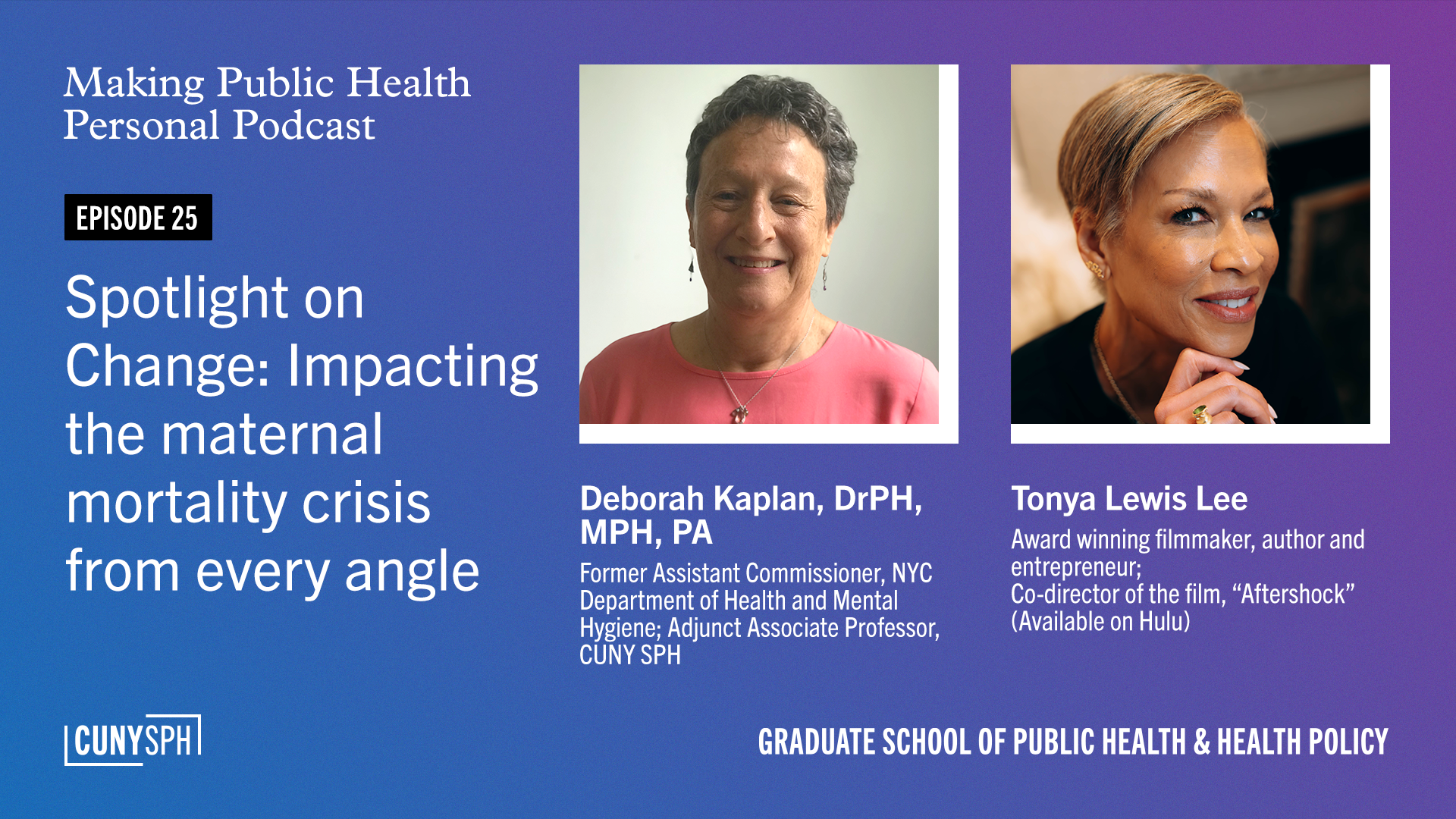
Episode 25 | Spotlight on Change: Impacting the maternal mortality crisis from every angle
In this episode:
According to alarming statistics from the CDC, Black women in the US face a stark reality: they are three times more likely to die from pregnancy-related causes than their White counterparts. In New York City, the situation is even more dire with the mortality risk rising to nine times more likely for Black women than for White women. But why? On this episode of the Making Public Health Personal podcast, join host Laura Meoli-Ferrigon and guests Dr. Deborah Kaplan and Tonya Lewis Lee as they unpack the systemic factors contributing to these disparities and explore what can be done to address them.
Dr. Deborah Kaplan brings to the discussion over four decades of expertise in public health, particularly focusing on maternal, infant, sexual, and reproductive health. As a fierce advocate for racial and gender equity in perinatal outcomes, Dr. Kaplan sheds light on the urgent need to dismantle structural barriers that perpetuate health inequities among communities of color. From her role as Assistant Commissioner of the New York City Department of Health and Mental Hygiene to her current endeavors at CUNY SPH, Dr. Kaplan is not just an ally but a fighter in the pursuit of reproductive justice. We discuss important issues ranging from bodily autonomy to the impact of global conflicts on women and children. Gain helpful insights on how to think globally and act locally in our pursuit of maternal health, reproductive rights, and justice.
We are also joined by the multi-talented Tonya Lewis Lee, an award-winning filmmaker, author, and entrepreneur. Tonya shares insights from her groundbreaking documentary, AFTERSHOCK, which confronts the US maternal mortality crisis. Through powerful storytelling, this film underscores the importance of amplifying marginalized voices and advocating for systemic change. From discussing the history of reproductive justice to emphasizing the importance of recognizing pregnant people, not just women, Tonya inspires us to utilize our own unique talents to create change.
Transcript:
Episode Links:
Connect with Deborah Levine on Linkedin: https://www.linkedin.com/in/deborah-l-kaplan-19842b169
Connect with Tonya Lewis Lee on Facebook and Instagram: @TonyaLewisLee
Watch Aftershock (film) now on Hulu or visit: https://www.aftershockdocumentary.com
View the trailer for Aftershock: https://www.youtube.com/watch?v=k63RC0rJEd8
Previous Episodes
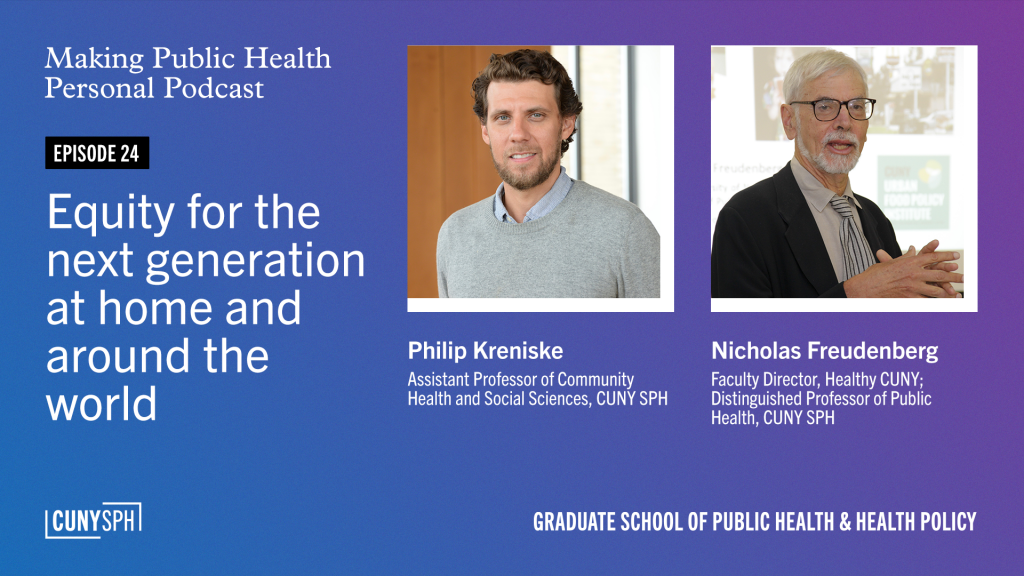
Are you passionate about making a positive impact on marginalized communities facing public health challenges?
This episode of the Making Public Health Personal podcast delves into effective strategies for addressing health issues both locally and globally and explores the unexpected parallels that can drive meaningful change.
Join host Laura Meoli-Ferrigon as she welcomes two distinguished guests: Dr. Philip Kreniske, assistant professor of Community Health and Social Sciences at CUNY SPH and adjunct assistant professor in the Heilbrunn Department of Population and Family Health at Columbia University’s Mailman School of Public Health, and Dr. Nicholas Freudenberg, Distinguished Professor of Public Health at CUNY SPH and the faculty director of Healthy CUNY.
Dr. Kreniske discusses his experience using implementation science to study adolescent health in the US and Sub-Saharan Africa. He highlights the research findings and policy implications designed to tackle socioeconomic and racial disparities, which are key contributors to the elevated rates of HIV and mental health symptoms among adolescents. Listeners will gain valuable insights into tailoring public health communication strategies for adolescent care, and discover innovative approaches and technology uses proven to prevent youth HIV and related issues.
Next, Laura shifts the conversation and discusses local challenges and solutions with Dr. Freudenberg. Learn about the innovative CUNY CARES program, which offers vital services such as healthcare, mental health support, and essentials like food and housing to CUNY students. Dr. Freudenberg explores the evidence-based strategies that make CUNY CARES effective, ways you can support this significant effort, and how students in need can access these crucial resources. Listen in as the conversation navigates the complexities of health equity and discover actionable insights to make a meaningful difference in marginalized communities, both locally and globally.
Transcript:
Episode Links:
Find out more and contact Dr. Kreniske
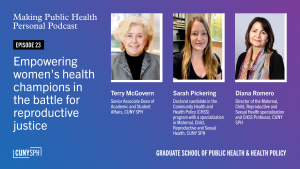
This special Women’s History Month episode of the Making Public Health Personal podcast breaks down the pressing issues surrounding maternal, child, reproductive, and sexual health in the United States.
Host Laura Meoli-Ferrigon speaks with three guests, a CUNY SPH dean, faculty, and doctoral student, who delve into the unique curriculum offered at CUNY SPH that addresses these crucial areas in sexual and reproductive justice, and outline some of the exciting new initiatives from the CUNY SPH Sexual and Reproductive Justice Hub, including the prestigious Byllye Avery Endowed Professorship in Sexual and Reproductive Justice.
Tune in to learn about the ongoing research aimed at safeguarding reproductive rights across the nation. Join us as we uncover ways that you can actively contribute to the preservation of reproductive rights and enact meaningful change.
GUESTS:
Terry McGovern: Senior Associate Dean of Academic and Student Affairs at CUNY SPH. Previously, the Harriet and Robert H. Heilbrunn Professor and chair of the Heilbrunn Department of Population and Family Health at the Columbia University Mailman School of Public Health
Sarah Pickering: Doctoral candidate in the Community Health and Health Policy (CHSS) program at CUNY SPH with a specialization in Maternal, Child, Reproductive and Sexual Health.
Diana Romero: Director of the Maternal, Child, Reproductive and Sexual Health specialization and CHSS Professor.
Transcript:
Download a transcript of this episode for accessibility
Episode Links:
Organizations to support reproductive justice:
Planned Parenthood Abortion Access
Learn more and connect with today’s guests:
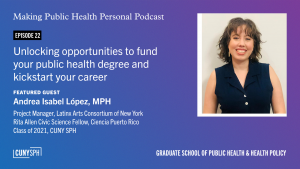
Are you looking to pursue a career that supports a cause close to your heart but don’t know where to start? In the latest episode of the Making Public Health Personal podcast, host Laura Meoli-Ferrigon speaks with Andrea Isabel López about her inspiring journey to success after graduating with an MPH in community health from CUNY SPH. Andrea is currently project manager for the Latinx Arts Consortium of New York and Rita Allen Civic Science Fellow with Ciencia Puerto Rico.
Listen in for valuable advice on building a lucrative career in public health, incorporating personal passion into your work, and unlocking opportunities for scholarships and fellowships to maximize your graduate school investment. Don’t miss this inspiring episode that explores the intersection of personal commitment and professional achievement.
Transcript:
Download a text transcript of this episode
Episode Links:
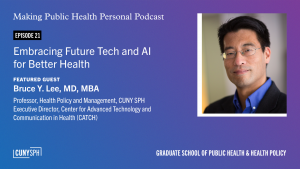
Have you ever wondered who has access to your data when you let your devices track things like your steps, food intake, and heart rate? Will artificial intelligence (AI) chat bots replace doctors?
On this episode of the Making Public Health Personal podcast, host Laura Meoli-Ferrigon speaks with CUNY SPH Professor Bruce Y. Lee, MD, MBA, about the benefits and disadvantages of advanced technology and AI, and how to embrace technology for a better future.
Dr. Lee provides invaluable insights for how to make sure you’re getting the most relevant and personalized diet and exercise recommendations from your apps. He discusses current trends and new innovations in advanced technology and communications, including precision nutrition, public health communications, AI in education, virtual/augmented reality (VR/AR), and much more. Listen in as we embrace the transformative potential of technology in improving health outcomes and making a tangible impact on communities worldwide.
Dr. Lee is a professor of health policy and management at CUNY SPH where he is the executive director of the Center for Advanced Technology and Communication in Health (CATCH) and the Artificial Intelligence, Modeling, and Informatics for Nutrition Guidance and Systems (AIMINGS) Center which is supported by the National Institutes of Health (NIH) and serves as the AI Center for the NIH’s Nutrition for Precision Health (NPH) Consortium. He is a systems modeler, professor, writer, journalist, an expert in computational and digital health and artificial intelligence who has authored over 255 scientific publications focused on developing and using new systems, computational, and AI/modeling methods. Dr. Lee writes extensively for the general media including the NY Times, HuffPost, Time and The Guardian, among many others. He is a senior contributor for Forbes, has a blog for Psychology Today and his work and expertise have been featured on television, radio, and other forms of media.
Transcript:
Download a text transcript of this episode
Episode Links:
Find out more and connect with Bruce Y. Lee
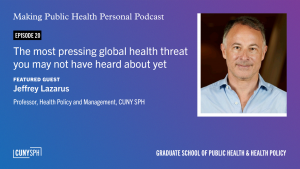
Host Laura Meoli-Ferrigon is joined by guest Jeffrey Lazarus, a professor of global health in the Department of Health Policy and Management at CUNY SPH, and a research professor at the Barcelona Institute for Global Health (ISGlobal) in Spain.
In this episode, Professor Lazarus discusses the most prevalent liver disease in human history, and why it is largely unknown to the general population. Formerly referred to as non-alcoholic fatty liver disease, metabolic dysfunction–associated steatotic liver disease (MASLD) affects an estimated 38% of the global adult population, and around 13% of children and adolescents. Professor Lazarus sheds light on the significance of assigning a new name and diagnostic criteria to this disease. Discover preventive measures, reversal strategies, and the need for integrative services to transform global liver health
Transcript:
Download a text transcript of this episode
Episode Links:
Learn more and connect with Jeffrey V Lazarus
A multisociety Delphi consensus statement on new fatty liver disease nomenclature
NAFLD — sounding the alarm on a silent epidemic
It is time to expand the fatty liver disease community of practice
A global research priority agenda to advance public health responses to fatty liver disease
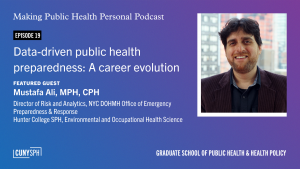
Host Laura Meoli-Ferrigon speaks with Mustafa Ali, director of risk and analytics at NYC DOHMH Office of Emergency Preparedness & Response. Mustafa received his BA in environmental justice from the CUNY Baccalaureate program and a master of public health degree from Hunter College, one of the three founding institutions from which CUNY SPH evolved.
In this episode, Mustafa Ali shares his insights into the evolution of GIS, mapping and other data analysis technology since graduation, shedding light on how he has managed to stay at the forefront of these changes to advance his career. Mustafa presents a unique perspective on how his job transformed during and after the COVID-19 pandemic and offers invaluable advice for individuals looking to embark on a fulfilling career in public health.
Tune in to explore the dynamic intersection of technology, public health and personal growth with Mustafa Ali, and discover the keys to navigating this ever-evolving field. Subscribe now to Making Public Health Personal for more engaging discussions that bring public health closer to home.
Transcript:
Download a text transcript of this episode
Episode Links:
Connect with Mustafa on LinkedIn
Career Opportunities at NYC DOHMH Pipeline to Preparedness & Community Preparedness Fellowships
Community Preparedness Program
HRTP: A Public Health Internship Program at the NYC Health Department
CDC Public Health Emergency Preparedness (PHEP) Cooperative Program
Download a text Transcript of this episode
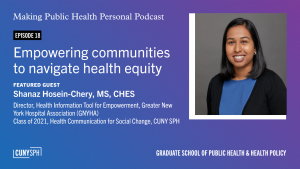
Join host Laura Meoli-Ferrigon on the Making Public Health Personal podcast as she speaks with CUNY SPH alumna Shanaz Hosein-Chery MS, CHES, a certified community health education specialist with nearly a decade of experience in public health.
Shanaz’s work focuses on health communication, social determinants of health, health disparities, health equity and social justice. As director of the Health Information Tool for Empowerment, operated by the Greater New York Hospital Association (GNYHA), Shanaz and her team ensure equitable access to healthcare resources for communities.
In this episode, Shanaz describes the challenges of overcoming healthcare barriers after immigrating to the United States from Trinidad and Tobago at the age of eight, and how the experience influenced her commitment to public health equity.
Shanaz also offers expert advice on navigating the accuracy of public health content, empowering listeners to confidently assess information online. Whether you’re a seasoned public health professional or aspiring to enter this field, our guest’s wisdom and experiences provide invaluable guidance and inspiration to make a difference.
Transcript:
Download a text transcript of this episode
Episode Links:
Learn more about the Health Information Tool for Empowerment
Connect with Shanaz on LinkedIn
Download an episode transcript for accessibility
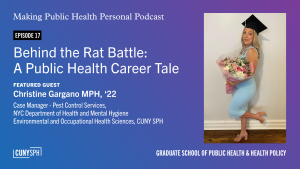
In this episode, Christine discusses her experience pursuing her MPH degree in environmental and occupational health sciences while juggling a full-time job. We’ll delve into her transition from a career in finance to her true calling in public health and how her previous experience in finance became an unexpected asset in her current position. She shares invaluable advice for anyone seeking to change careers to meaningfully impact public health, including how being authentic and genuine during her job interview landed her the dream role.
As a recent recipient of the Neighborhood Rat Reduction Award and the Distinguished Service Award for her pivotal role in the COVID-19 pandemic response and the “Key to NYC” initiative, Christine brings a wealth of experience and passion to the table. She works tirelessly in the Bureau of Veterinary and Pest Control Services, where she confronts one of NYC’s most common yet challenging health issues – rodents.
Listen now and learn how Christine’s dedication and hard work is shaping a healthier future for New York City and beyond.
Transcript:
Download a text transcript of this episode
Episode Links:
Connect with Christine
Find out more about career opportunities at NYC DOHMH
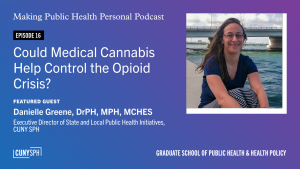
In today’s episode of the Making Public Health Personal podcast, host Laura Meoli-Ferrigon speaks with Danielle Greene, DrPH, MPH, MCHES, Executive Director of State and Local Public Health Initiatives at CUNY SPH and one of the authors of the groundbreaking study on medical cannabis and opioid prescriptions.
The study, “Changes in Prescribed Opioid Dosages Among Patients Receiving Medical Cannabis for Chronic Pain,” found an association between receiving medical cannabis for chronic pain for a longer duration and a reduction in prescription opioid dosages.
Dr. Greene brings over 30 years of public health leadership experience to the discussion and shares her insights on how medical cannabis can be used as another tool in response to the opioid epidemic. Listen and learn about the history of cannabis and opioids in the country, the evolution of pain management practices and the future of medical and recreational cannabis as more states legalize it. Join the conversation on how legalization can be done safely and equitably.
Transcript:
Download a text transcript of this episode
Episode Links:
Find out more about this study
Connect with Dr. Greene on LinkedIn
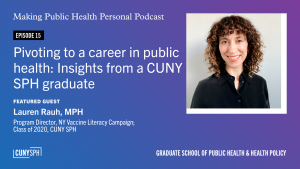
In this episode of the Making Public Health Personal podcast, host Laura Meoli-Ferrigon speaks with CUNY SPH alumna Lauren Rauh. Since graduating in 2020 with her master of public health degree, Lauren is now program director of the New York Vaccine Literacy Campaign (VLC) at CUNY SPH. Lauren shares how her experience in the food industry prepared her for her current role, and the challenges and opportunities she faced when pivoting careers. We also discuss the future of the VLC and how they are expanding their model to address systemic challenges around resources and information for preventative health care.
Lauren shares tips on how to evolve professionally and find new opportunities in the quickly-changing world of public health. She also advises how to tell if public health is the right career choice for you, without having to quit your day job. Join us to learn how to make a successful career pivot while making a positive impact on the health of your community.
Transcript:
Episode Links:
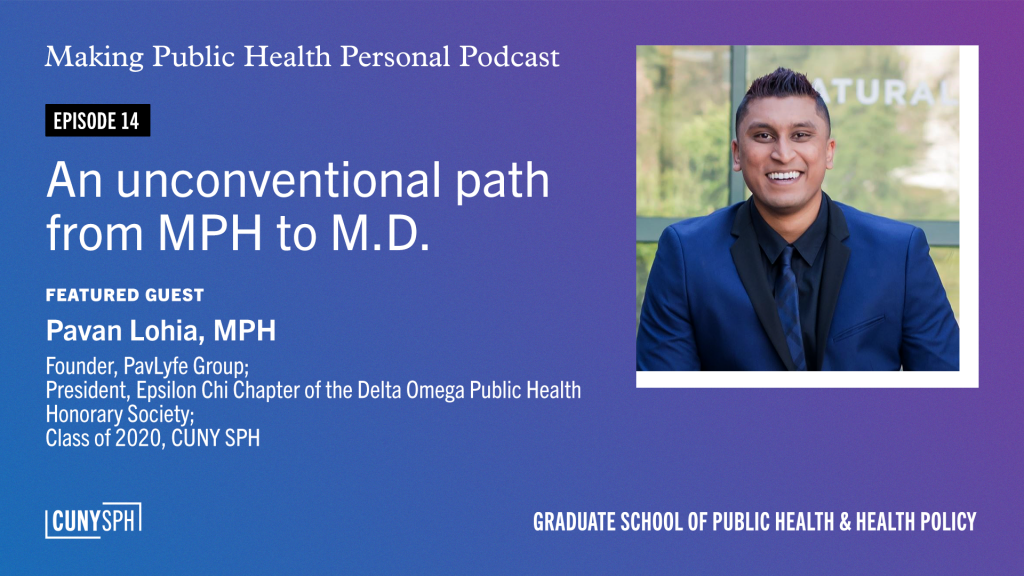
There are endless possibilities that a public health degree can open up for you. Whether you are looking to pursue a career in healthcare, government, research, academia & public service, or if you want to start your own business, an MPH degree can put you on the path towards success.
In this episode of the Making Public Health Personal Podcast, CUNY SPH graduate Pavan Lohia (MPH, 2020) explains how huge of a commitment it is to pursue your Medical Doctorate, with many sacrifices both socially and financially. He shares a roadmap of his pre-med journey and explains how the opportunities available at CUNY SPH opened doors that he never would have expected. Learn how to gain leadership skills and experience while still in school, how to plan for your future goals and what you can do with your public health degree.
Pavan Lohia graduated from CUNY SPH in 2020 with a Master of Public Health (MPH) concentrating in Population health and clinical sciences. He was awarded the Dean’s Merit Award for Service as well as Honors from the Epsilon Chi Chapter of the Delta Omega Public Health Honorary Society, of which he is a Founding Member & President. Pavan also served as President of the Graduate Student Government Association at CUNY SPH. From being a leader at his school to being a leader in public health, Pavan is the founder of PavLyfe Group, a healthcare brand and investment firm that is redefining healthcare through knowledge, innovative technology, and capital investments. During his time as a Clinical Researcher at the Icahn School of Medicine at Mount Sinai, part of his fieldwork at CUNY SPH, he led major healthcare research projects related to Covid-19 and the long-term health impacts to 9/11 World Trade Center workers. While working at the National Science Foundation, in 2019 he was selected from the Presidential Pathways Program and he worked on international and national scale projects. This work led him to receive the 2021 Scientific Achievement of the Year Award from the NSF.
Transcript:
Episode Links:
Pavan Lohia can be reached via email at pavanlohia@pavlyfe.com or connect with him on these platforms:
- Website: www.pavlyfe.com
- LinkedIn: www.linkedin.com/in/lohiapavan
- Instagram/Twitter: @pavlyfe
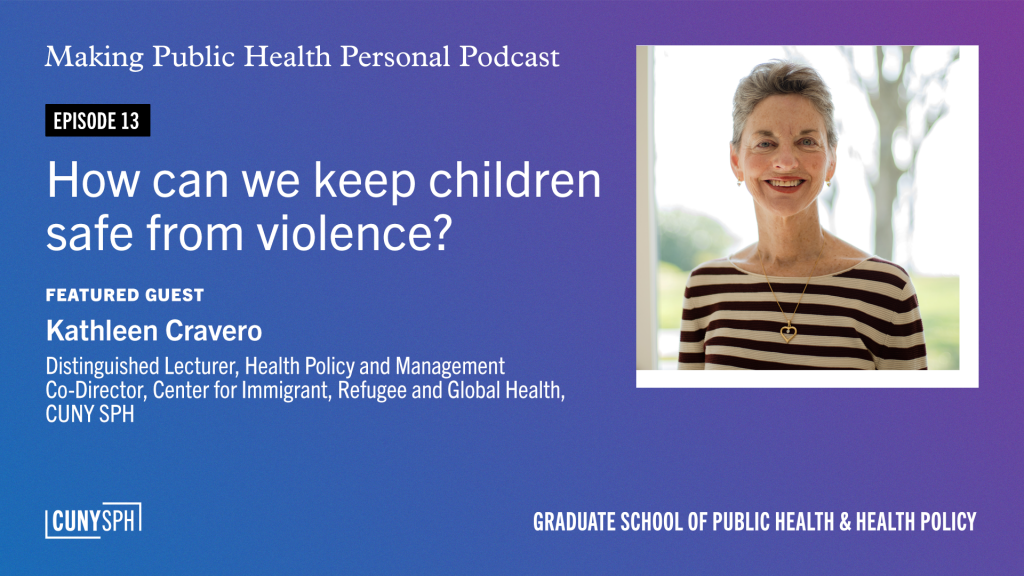
You may not be surprised, with the level of gun violence in this country, that the U.S. has one of the highest rates of school violence in the world. But violence against children is perpetrated in homes and in schools, in many forms, and in families and countries rich and poor.
As the future of our society, either we prevent violence against children while they are young, or we will have to take care of the consequences as they get older. Whether they are your children or someone else’s, children are the future of our society, making them everyone’s responsibility to keep safe. This includes preventing them from witnessing violence, which also has very serious long-lasting effects. Violence against children is one of the biggest public health problems of our time, and there are dedicated people working to end it on a global scale. But what can we do to help?
In this episode of the Making Public Health Personal podcast, we discuss evidence-based strategies to prevent and end violence against children.
Host Laura Meoli-Ferrigon speaks with today’s guest Dr. Kathleen Cravero, Distinguished Lecturer in the Department of Health Policy and Management and Co-Director of the Center for Immigrant, Refugee and Global Health here at CUNY SPH. She spent 25 years working for the United Nations, including a key role at UNICEF, and dedicates her career to ending violence against women and children.
Dr. Cravero will discuss seven evidence-based strategies based on findings from the violence against children and youth surveys that were collected over 10 years in 24 countries. She’ll discuss who is most affected, where they live and how government officials can decide which evidence-based strategy to implement.
No matter what your sphere of influence is, this episode will provide resources to become part of the solution.
Transcript:
Episode Links:
- Find out more and connect with Dr. Kathleen Cravero
- Keep Kids Safe – Prevention. Healing. Justice
- Keeping Children Safe – Let’s end child abuse in organisations
- End Violence
- End Childhood Sexual Violence
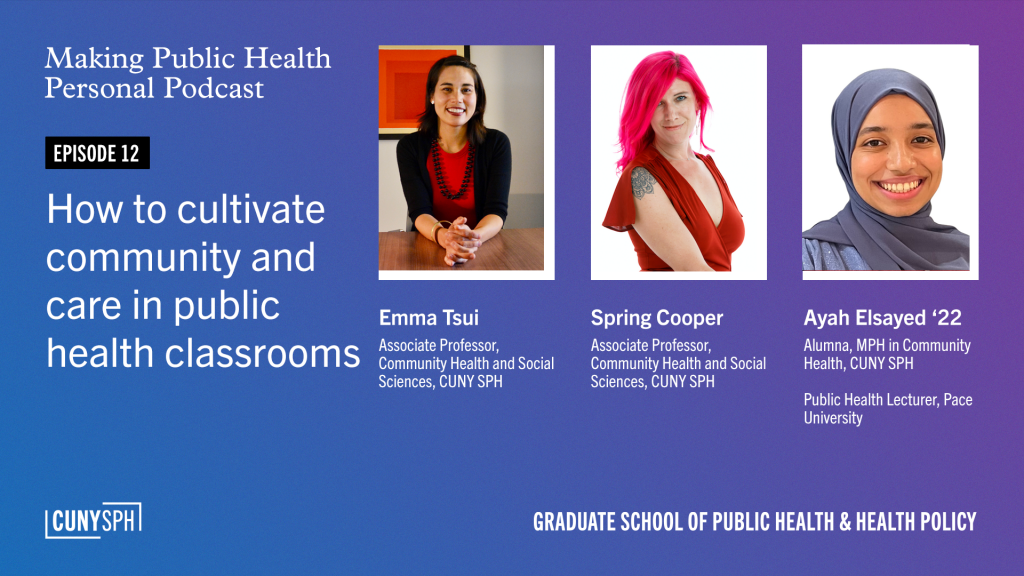
This episode of the Making Public Health Personal podcast looks at an oral history project at CUNY SPH called Public Health Education Now. This project asks students, faculty and staff at CUNY SPH how their lived experiences since 2020 have shaped their vision of what we want public health education to be.
Host Laura Meoli-Ferrigon speaks with three members of the Public Health Education Now team about how they use the lessons they’ve learned from this project in their anti-racist classrooms today. The team conducted oral history interviews, focusing on experiences of not only the COVID-19 pandemic, but also the increased visibility of racism and other types of oppression, and movements for racial justice that are reverberating both in and out of the classroom. While working on this project, the team learned how to overcome major breakdowns in communication by using a method called restorative circles, and used the power of pause to get back on track.
The team provides tips on how to create meaningful group assignments that allow for reflection and reinforce learning. One of these suggestions is actually to make public health personal! The team also offers other important pedagogy tips which can promote a culture of acceptance, healing and respectful collaboration in the classroom and beyond. The Public Health Education Now project was co-led by two CUNY SPH Associate Professors from the CUNY SPH Department of Community Health and Social Sciences, Drs. Emma Tsui and Spring Cooper.
Dr. Emma Tsui focuses on intersections of community health, occupational health and social sciences. Her research methods include innovative methods such as peer interviewing, digital storytelling, and oral history, which is the format used for this particular project.
Dr. Spring Cooper is a social researcher with experience in public health, health promotion and sexuality. Her academic background focuses on BioBehavioral health and prevention, as well as sexual health education and knowledge among young people.
Ayah Elsayed, a CUNY SPH alumna, helped design the project, conducted interviews and worked to build and maintain the audio archive for the Public Health Education Now project. She graduated in 2022 with her MPH and now teaches public health at Pace University.
Transcript:
Episode Links:
- Anti-racist teaching collaborative
- Learn more and connect with Dr. Emma Tsui
- Learn more and connect with Dr. Spring Cooper
- Learn more and connect with Ayah Elsayed
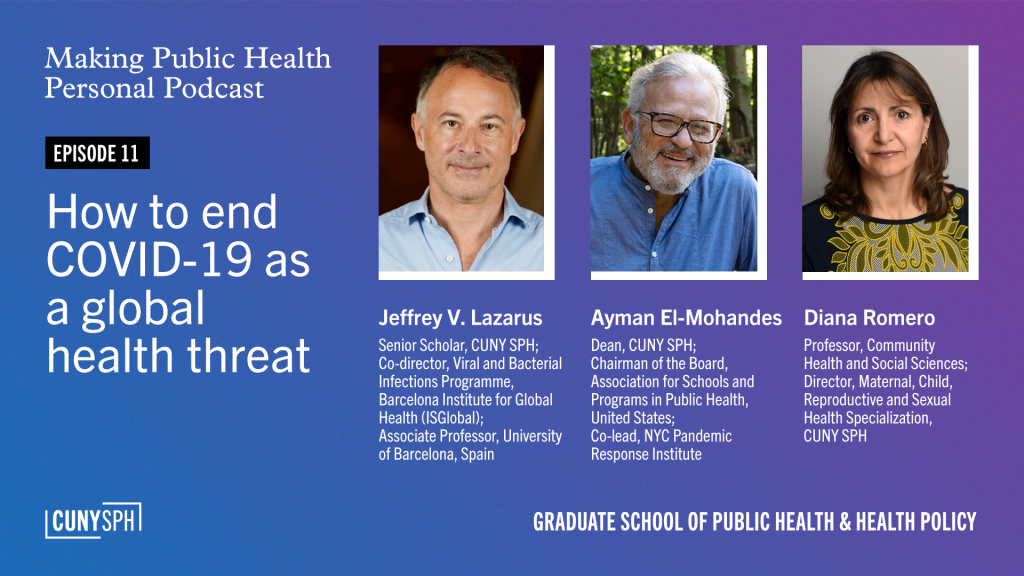
Is the COVID-19 pandemic really over? How many vaccines and boosters we will need, and how often? Should we continue wearing masks? In this special episode of the Making Public Health Personal Podcast, host Laura Meoli-Ferrigon speaks with three experts from CUNY SPH who are part of the global panel responsible for a new study synthesizing the best ideas on how we move forward from the pandemic. A consensus was reached among almost four hundred experts to provide specific recommendations to end COVID-19 as a public health threat, and published in Nature, the world’s leading multidisciplinary science journal. It features specific actions unanimously recommended by a panel of public health experts from 112 countries and territories. We’ll discuss the process for coordinating this type of study, the major areas it addresses, and the practical tips that you can take to protect yourself from COVID-19, no matter where you live in the world.
This episode’s guest speakers include:
Dr. Jeffrey V. Lazarus, panel leader and CUNY SPH Senior Scholar, is the head of the Health Systems Research Group and co-director of the Viral and Bacterial Infections Programme at the Barcelona Institute for Global Health, and an Associate Professor at the University of Barcelona. His decade-long career as a health systems, HIV and viral hepatitis expert at WHO’s Regional Office for Europe was followed by three years at the Global Fund to Fight AIDS, Tuberculosis and Malaria. He currently serves as co-chair of the HIV Outcomes Beyond Viral Suppression coalition, and as a member of several other public health committees worldwide.
Dr. Ayman El-Mohandes, the Dean of CUNY SPH and co-chair of the panel, is a pediatrician, public health academic and researcher with a deep commitment to public service and community engagement. He is Chairman of the board for the Association for Schools and Programs in Public Health (US), and Co-lead of the NYC pandemic response institute. Dr. El-Mohandes has been actively engaged in the response to Covid-19 here in New York City and around the world through an ongoing tracking survey monitoring the experiences and perspectives of NYC residents. He is also collaborating with an international consortium to assess and respond to Covid-19 vaccine hesitancy worldwide.
Dr. Diana Romero, the study methodologist and co-author, is a Professor in the Department of Community Health and Social Sciences and she directs CUNY SPH’s specialization on Maternal, Child, Reproductive and Sexual Health. Dr. Romero’s research has focused on reproductive and sexual health, social policies related to the health of poor and low-income populations, and health care access among underserved populations, employing mixed-method study designs. She recently led the COVID and Pregnancy (CAP) survey study examining the impact of the early period of the pandemic on women in New York, USA.
Transcript:
Episode Links:
Find out more about the Delphi study: cunysph.me/nature
Read the article/study here: https://www.nature.com/articles/s41586-022-05398-2
Contact & find out more about Jeffrey V. Lazarus: https://sph.cuny.edu/about/people/senior-scholars/
Contact & find out more about Dr. Ayman El-Mohandes: https://sph.cuny.edu/about/people/faculty/ayman-el-mohandes/
Contact & find out more about Dr. Diana Romero: https://sph.cuny.edu/about/people/faculty/diana-romero/
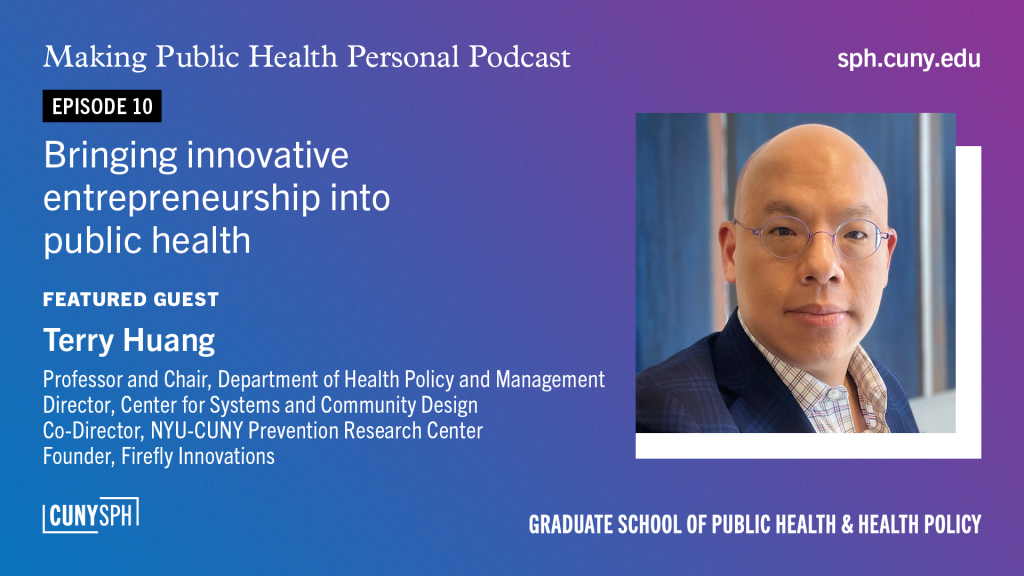
How can we transform public health into an innovative, forward-thinking community of change agents willing to act quickly to meet the challenges and public health crises in our world? The Health Policy and Management curriculum at CUNY SPH has been preparing public health professionals to become innovation-driven leaders willing to challenge the status quo.
Today’s guest on the Making Public Health Personal podcast is Dr. Terry Huang, Professor and Chair of the Department of Health Policy and Management at CUNY SPH. He is also Director of the Center for Systems and Community Design at CUNY SPH, and developed a public health entrepreneurship platform called Firefly Innovations. Dr. Huang speaks with host Laura Meoli-Ferrigon about how his interdisciplinary background inspired a hands-on curriculum which develops leadership skills in our students so they can become innovative, forward-thinking leaders in public health. Dr. Huang discusses why the entrepreneurial mindset is more important than ever, and how to use it to transform organizations, communities, and society at large.
Whether you’re interested in entrepreneurship and starting your own business, or becoming an intrapreneur who brings these important skills into your organization, the Health Policy and Management curriculum at CUNY SPH can give you the tools you need to become a leader in public health. Learn more about the degrees offered in the Department of Health Policy and Management.
Transcript:
Episode Links:
Contact & find out more about Dr. Terry Huang: https://sph.cuny.edu/about/people/faculty/terry-huang/
Firefly Innovations: https://firefly-innovations.com
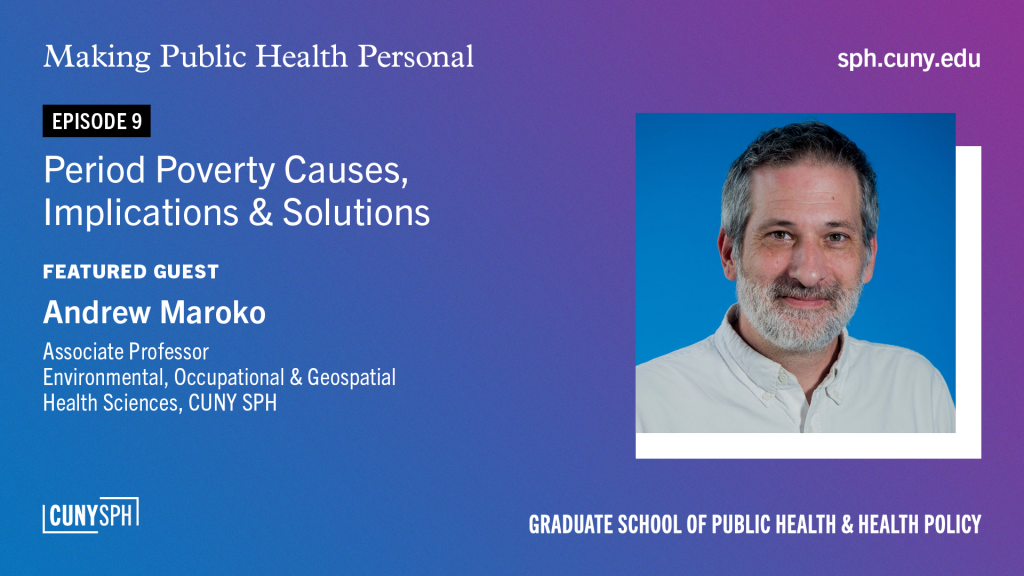
This episode of the Making Public Health Personal Podcast is about a hot topic you may have been hearing about lately, period poverty, otherwise known as menstrual product insecurity. The COVID-19 pandemic has exacerbated the inequity that women endure as a result of menstruation. Not only are these essential items (tampons, pads, etc.) taxed in a lot of US states, they are also not covered under public assistance or emergency response programs. These gendered (and sex-based) burdens have a negative impact on people’s physical and mental health, especially for the most vulnerable populations with lower incomes.
Dr. Andrew Maroko, Associate Professor in the Environmental, Occupational, and Geospatial Health Sciences department here at CUNY SPH, discusses this important topic with host Laura Meoli-Ferrigon. Dr. Maroko’s research examines health disparities, inequities, exposures, accessibility, and environmental justice. He recently collaborated with faculty at Columbia University and here at CUNY SPH on a US based study called “Menstrual Product Insecurity Resulting From COVID-19‒Related Income Loss”.
In this episode, we will learn:
- who is most affected by the inability to afford menstrual products
- how this issue (like many other issues) was exacerbated by the COVID-19 pandemic
- how the policies we have in place in the United States surprisingly do very little to combat this problem
- how Dr. Maroko’s research is being used to influence lawmakers towards more equitable policies
- and what you can do to make a difference.
Transcript:
Episode Links:
- Contact & find out more about Dr. Andrew Maroko: https://sph.cuny.edu/about/people/faculty/andrew-maroko/
- Chasing COVID Study: https://cunyisph.org/chasing-covid/
- Mesntrual Product Insecurity Resulting From COVID-19‒Related Income Loss: https://ajph.aphapublications.org/doi/full/10.2105/AJPH.2021.306674
- Ways to get involved and make a difference:
- period.org
- allianceforperiodsupplies.org
- www.periodlaw.org
- Queens Congresswoman Grace Meng: https://meng.house.gov
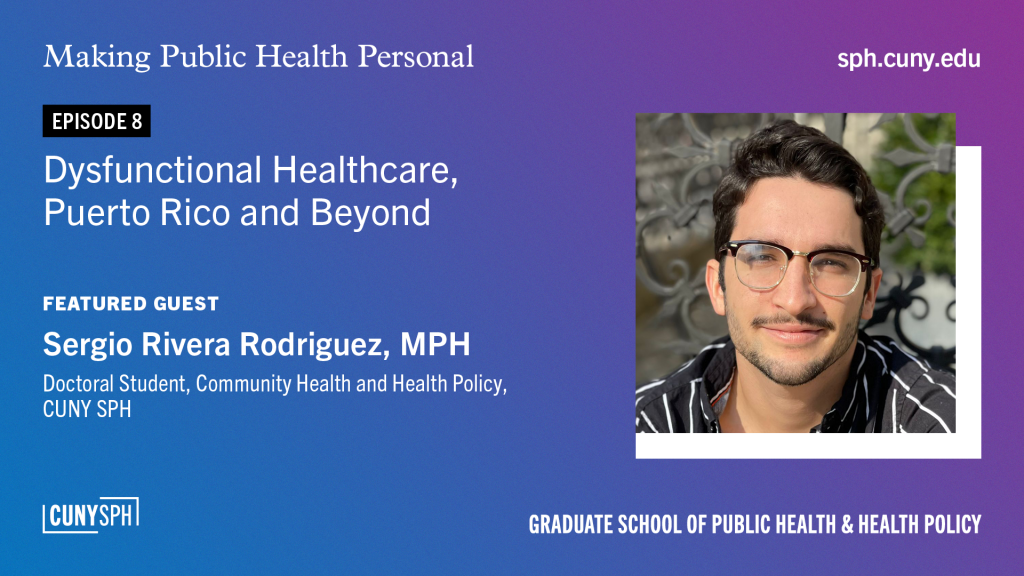
If you think the healthcare system in the United States is over-complicated and inequitable, you might be surprised to learn about the corruption and lack of access to and affordability of healthcare that most citizens of Puerto Rico face. In this episode of the Making Public Health Personal podcast, CUNY SPH doctoral student Sergio Rivera Rodriguez, MPH gives us context on the political history of Puerto Rico and how their healthcare system became what it is today.
Host Laura Meoli-Ferrigon inquires about Sergio’s current research project which aims to expand health care coverage to every citizen on the island. Based on his data collection and analysis, he describes the differences in access, utilization, and cost of health care services by health insurance status, including the elderly and people living in poverty. This data is severely lacking in Puerto Rico, where there is not even an accurate count of how many people are uninsured. In order to create efficient policy reforms, hold private health insurance companies accountable for their spending, and adequately fund public programs (such as medicare and medicaid), this data is essential.
What is the solution to Puerto Rico’s healthcare woes? How can we use this research into Puerto Rico’s system to create better healthcare access, affordability and satisfaction here in the United States? Are the other healthcare systems that other countries have in place working more effectively? The answers may surprise you.
Transcript:
Episode Links:
Contact and find out more about Sergio Rivera Rodriguez’s project:

Community organizing goes beyond protesting and posting on social media. It’s finding a cause you’re passionate about, joining with other people, and using your collective voices to make a difference. In this episode of the Making Public Health Personal podcast, we share tips for being an ally for social justice, even if you aren’t part of the community most impacted by injustice.
Our featured guest, Dr. Lynn Roberts, is the Associate Dean of Student Affairs and Alumni Relations and teaches in the department of Community Health and Social Sciences at CUNY SPH. She speaks with host Laura Meoli-Ferrigon about the collective efforts to advance sexual and reproductive health, rights and justice, providing strategies on how to get involved with strategies to raise awareness, including storytelling and coalition building. We discuss how advocates and community organizers in the digital age use strategies informed by the leaders of our past, to empower collective movements.
Dr. Roberts is an emeritus board member of the SisterSong Women of Color Reproductive Justice Collective. As the co-editor and contributing author of an acclaimed anthology titled “Radical Reproductive Justice: Foundations, Theory, Practice, Critique”, Dr. Roberts shares her personal commitment to radical reproductive justice in this episode. She explains how women of color, Indigenous people, the LGBTQIA+ community and many others face historic and contemporary challenges to human rights and health equity, stemming from years of systemic oppression. This is important to her research, which focuses on the intersections of race, class and gender in adolescent dating relationships, juvenile justice and reproductive health policies and practice.
Transcript:
Episode Links:
Radical Reproductive Justice: https://www.feministpress.org/books-n-z/radical-reproductive-justice
SisterSong Women of Color Reproductive Justice Collective: https://www.sistersong.net/
Contact & find out more about Dr. Lynn Roberts: https://sph.cuny.edu/about/people/faculty/lynn-roberts/
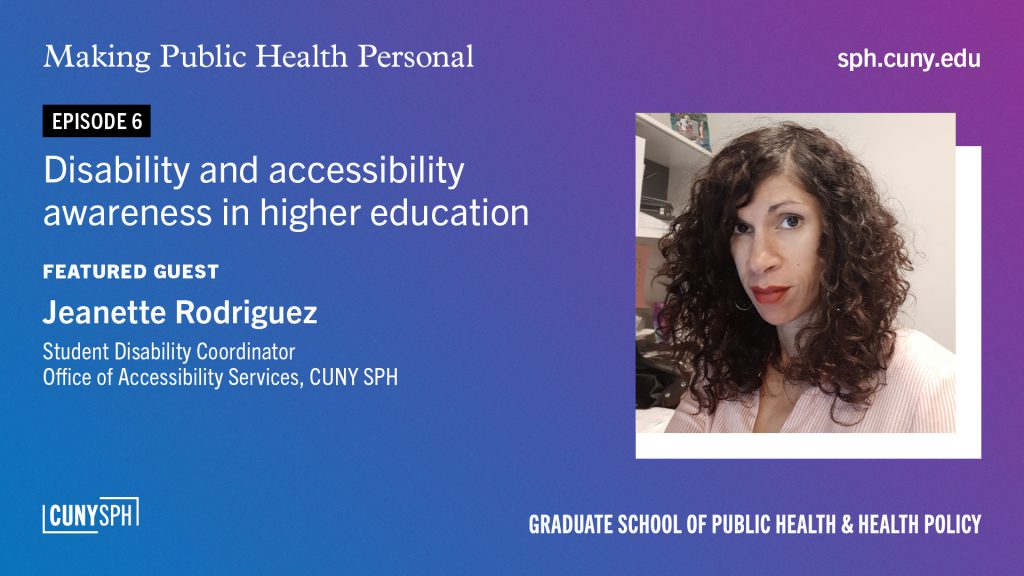
April is Disability Awareness Month at CUNY and this month’s episode of Making Public Health Personal explores disability and accessibility in higher education. Year-round, students with disabilities face added obstacles that make pursuing an education challenging. Disabilities can range from physical to mental, and often come with stigma that can be a barrier to seeking help. All college students, even graduate and doctoral students, are eligible for accommodations if they have medical documentation of their disability. They just have to know who at their school to reach out to for support. CUNY SPH students have the Office of Accessibility Services in their corner to help them succeed.
In this episode of the Making Public Health Personal podcast, we speak with Jeanette Rodriguez, the Disability Coordinator for students at CUNY SPH. Jeanette has worked in various roles at CUNY SPH since 2014. In addition to advocating for students with disabilities, she is also currently the Executive Assistant to the dean of the school. Her passion is to help others and encourage her community to give back to those in need.
Host Laura Meoli-Ferrigon speaks with Jeanette about the accommodations available to students with disabilities, and how they can obtain that support. We explore what exactly is considered a disability under the Americans with Disabilities Act, and future plans for the office to increase participation, eliminate stigma, and bring more awareness to the topic of student accessibility.
Transcript:
Episode Links:
CUNY Disability Awareness month events: https://www.cuny.edu/current-students/student-affairs/black-history-month-events-2-version/
To inquire and/or request accommodations with the Office of Accessibility at CUNY SPH, email: accessibility@sph.cuny.edu
Office of Accessibility Services at CUNY SPH: https://sph.cuny.edu/students/student-services/office-of-accessibility-services/
CUNY Disability Services: https://www.cuny.edu/current-students/student-affairs/student-services/disability/
CUNY Coalition for Students with Disabilities:
Children & Adults with ADHD podcasts: www.CHADD.org
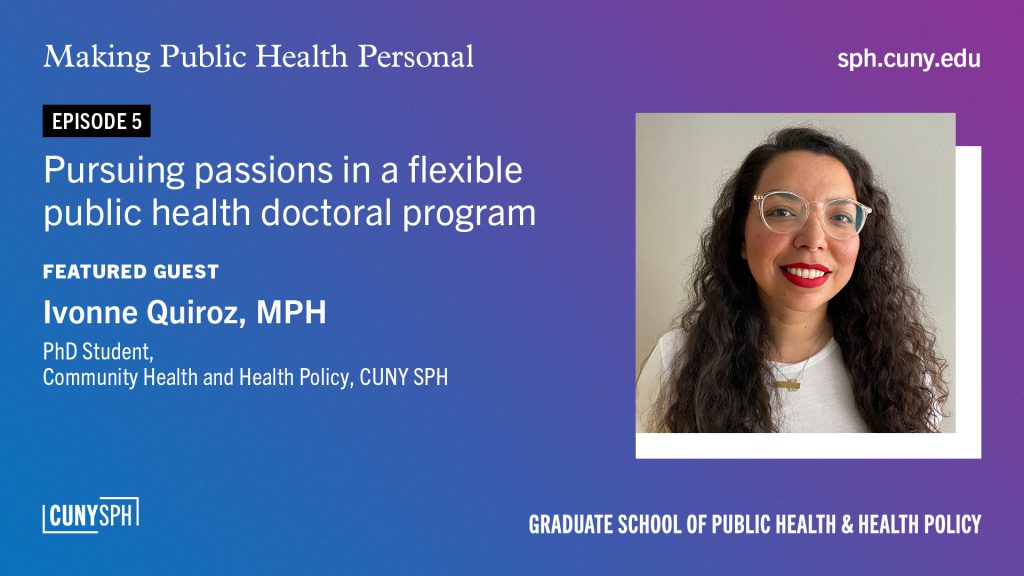
Adapting to a new life on the other side of the country while pursuing a PhD in the midst of a pandemic is no simple feat. In this episode of Making Public Health Personal, CUNY SPH doctoral student Ivonne Quiroz shares the story of her journey as a nontraditional student pursuing a public health education. Ivonne speaks with host Laura Meoli-Ferrigon about her passion for food justice, race, culture, and health. She also opens up about how she personally navigates challenges with ADHD and hopes that her story can illuminate for other neurodivergent students and students with disabilities that they too can navigate their own path to success.
Ivonne Quiroz is from California and graduated with a master’s degree in public health from the University of California, Irvine. She also has a bachelor’s degree in biology from San Francisco State University. Despite the physical distance from where she built her former career as an Organizational Director for social organizations on the West Coast, New York City was the perfect place for her to pursue a doctoral degree in Community Health and Health Policy. Not only is NYC diverse, but the programs available at CUNY SPH were a perfect fit for Ivonne. While the pandemic’s shift to fully online learning allowed her to balance her educational and career opportunities, the flexible classes regularly available at CUNY SPH allow Ivonne to thrive. While pursuing her PhD, she has gained experience as an adjunct faculty, teaching a course on Health Equity, Communication and Advocacy – a great resume builder for someone who wants to pursue research in higher education. Ivonne has also found career opportunities through her connections with CUNY SPH professors, as a research assistant at the CUNY Urban Food Policy Institute. Her personal mission as a Latina and public health advocate is being realized now, and surely will continue post-graduation.
For students interested in a similar path but not sure where to begin, this episode sheds light on the application process for a public health degree, the flexibility of CUNY SPH’s programs, and the career-building opportunities available to students. Ivonne’s story gives hope for anyone who doesn’t fit the mold of a traditional college student, but hopes to make a difference in the world.
Transcript:
Episode Links:
Centralized application for public health programs: https://sophas.org/
Disordered eating and food insecurity research: https://www.ncbi.nlm.nih.gov/pmc/articles/PMC4903957/pdf/nihms741592.pdf
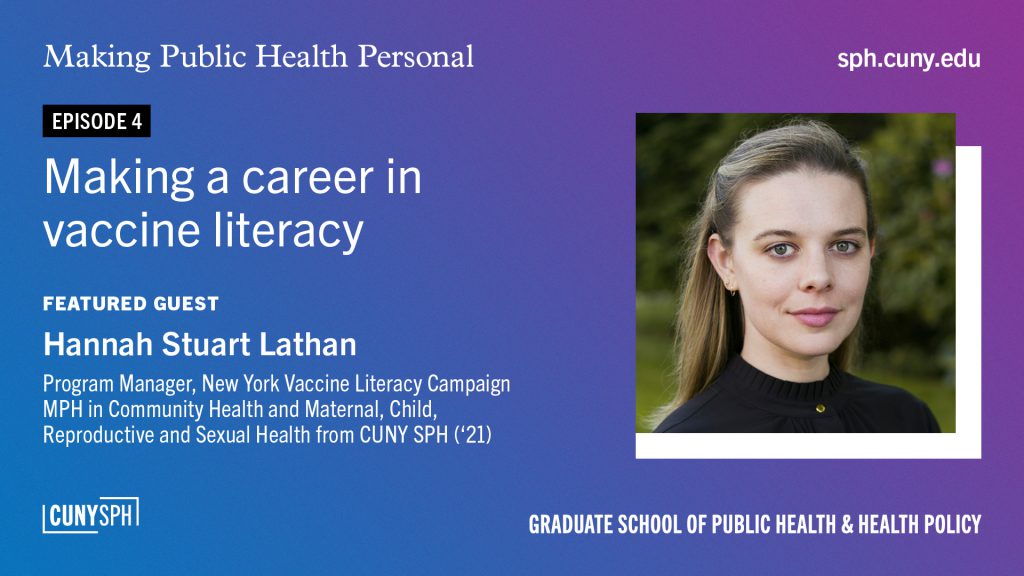
From valedictorian to vaccine advocate, the path to a successful career is not a predictable one — especially when you are pursuing your Master of Public Health degree during a pandemic. CUNY SPH Class of 2021 valedictorian Hannah Stuart Lathan shares her story with host Laura Meoli-Ferrigon in this episode. Lathan discusses her research and efforts around vaccination, and her journey to obtain her Master of Public Health degree and leveraging it to success in her career.
Hannah Stuart is from South Carolina and graduated with a degree in Journalism and Public Health from the University of South Carolina Honors College. She then made her way to New York City, working as a sexual health educator and counselor and later pursuing her MPH in Community Health, with a specialization in Maternal, Child, Reproductive and Sexual Health, at CUNY SPH. In addition to being selected valedictorian of her class, she also received the Dean’s Academic Achievement Award. Her research with faculty began while she was a student at CUNY SPH, and she was able to work full time while completing her degree. The professional connections she made here at CUNY SPH set her up with opportunities that continued beyond graduation. She also credits CUNY’s affordability for allowing her to graduate without student loan debt.
Currently, this hard working alumna is Program Manager for CONVINCE USA and the New York Vaccine Literacy Campaign at CUNY SPH, which supports community-based efforts to increase vaccine uptake through education and communication. She leads programmatic activities and events, and works to identify and mitigate concerns about vaccination. Her story is one that was not predictable, but surely is inspiring.
Transcript:
Episode Links:
Vaccine hesitancy research: https://journals.sagepub.com/doi/epub/10.1177/00027642211062865
Op-Ed on key considerations for employers contemplating covid 19 vaccine requirements: https://www.commonwealthfund.org/blog/2021/key-considerations-employers-contemplating-covid-19-vaccine-requirements
Vaccine Literacy Campaign and data: https://vaccineliteracycampaign.org/
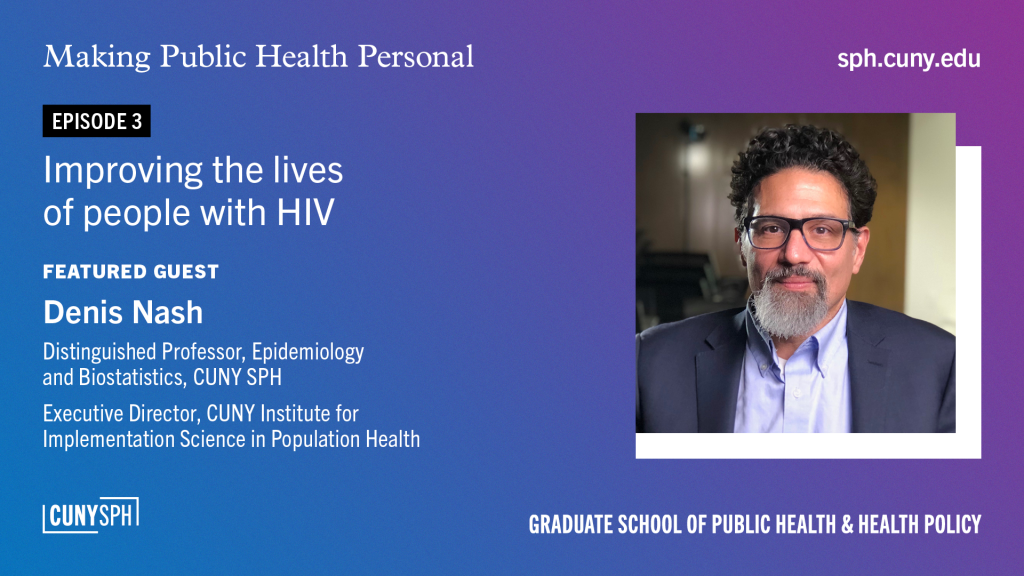
The HIV/AIDS pandemic has been around since the 1980s and over 36 million people have died of AIDS. Today over 37 million people are living with HIV, globally. With breakthroughs in prevention, treatment and care coordination in recent years, there are still barriers to achieving optimal HIV care outcomes. In the U.S., these barriers are intersecting epidemics such as mental health and substance abuse, unstable housing, and incarceration. This episode of Making Public Health Personal explores the unique challenges and stigma associated with HIV in the U.S., and how far medical interventions and public programs have come to improve the quality of life for people living with HIV. We also explore how lessons learned from the HIV pandemic can inform our response to the COVID-19 pandemic and the pandemics of the future.
Host Laura Meoli-Ferrigon from the SPH Office of Online Learning is joined by Dr. Denis Nash, Distinguished Professor of Epidemiology and Biostatistics at CUNY SPH. He is also the Executive Director of CUNY’s Institute for Implementation Science in Population Health. Dr. Nash has over 20 years of experience in infectious disease epidemiology on a national and global scale. He has published over 250 scientific articles and his research is primarily funded by the National Institutes of Health (NIH). In this episode, we will learn about his research projects which focus on improving the outcomes of people living with HIV in the Ryan White Program, an HIV care coordination intervention for people at very high risk of bad HIV care outcomes. We also discuss his new research on HIV injectables and the CHASING COVID Cohort study, to find similarities that can help us better respond to future pandemics.
Transcript:
Episode Links:
CUNY’s Institute for Implementation Science in Population Health: http://cunyisph.org
The CHASING COVID Cohort Study: https://cunyisph.org/chasing-covid/
The CHORDS Study in NYC’s Ryan White Program:
https://pubmed.ncbi.nlm.nih.gov/30248136/
https://pubmed.ncbi.nlm.nih.gov/30299346/
https://pubmed.ncbi.nlm.nih.gov/29788080/
The PROMISE Study in NYC’s Ryan White Program: https://pubmed.ncbi.nlm.nih.gov/32718922/
The APPLI Study of Long Acting Injectable ART in the Ryan White Program
Ryan White services in NYC: https://www1.nyc.gov/site/doh/health/health-topics/aids-hiv-care-treatment-and-housing.page
Contact & find out more about Denis Nash: https://sph.cuny.edu/about/people/faculty/denis-nash/
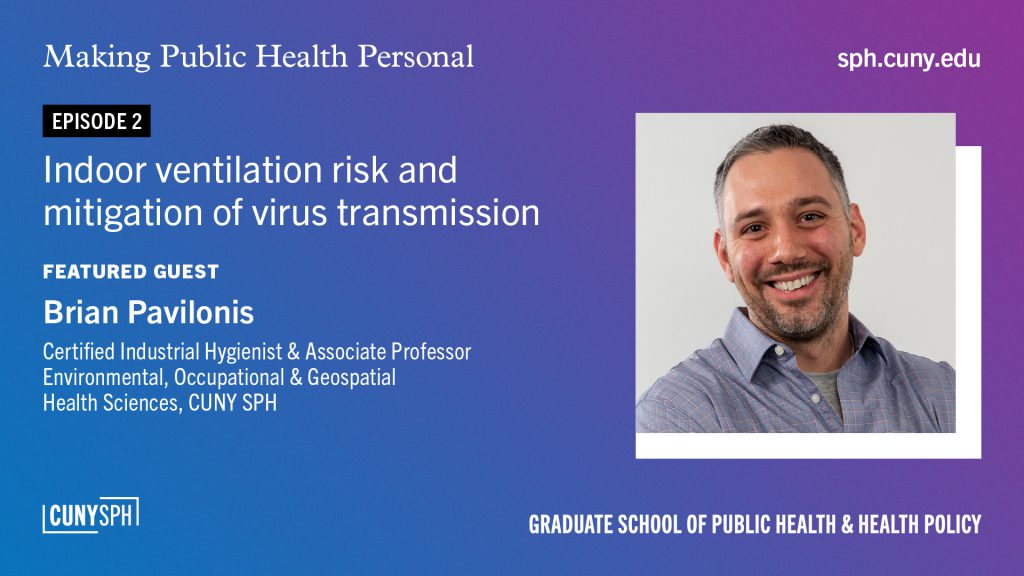
With schools opening up to in-person learning, offices welcoming back their workers, and the winter chill keeping us indoors, you might be wondering how to stay healthy and reduce your risk of catching a cold, the flu, or other airborne illnesses during indoor gatherings and in public settings. Is a child more likely to contract covid-19 from a classmate or from their teacher? How well-ventilated are NYC classrooms? Is it safe to go back to your cubicle? How can business owners, schools and landlords prepare for the next pandemic? The answers may surprise you.
In this episode of Making Public Health Personal, host Laura Meoli-Ferrigon is joined by Dr. Brian Pavilonis, Associate Professor at CUNY SPH and a certified industrial hygienist, to discuss some of his recent research and the important takeaways that are essential for ensuring safe post-pandemic classrooms and workplaces. Dr. Pavilonis’ study of occupational health and exposure science focuses on quantifying human exposure and risk to environmental pollutants, especially for disadvantaged workers and communities. We examine the current laws in place which mandate proper indoor ventilation in New York, and how enforcement is essential to truly protecting workers and communities.
Transcript:
Episode Links:
To file a complaint on behalf of nail salon workers or other workers who you believe are in poorly ventilated spaces, visit: www.DOS.NY.GOV/file-consumer-complaint or call the consumer assistance line: 800-697-1220
To report unsafe working conditions or inadequate ventilation measures on the job visit: www.OSHA.gov
Dr. Pavilonis’ research on NYC school ventilation and nail salon worker safety: https://scholar.google.com/citations?user=q_qZQcIAAAAJ&hl=en
Contact & find out more about Dr. Brian Pavilonis: https://sph.cuny.edu/about/people/faculty/brian-pavilonis/
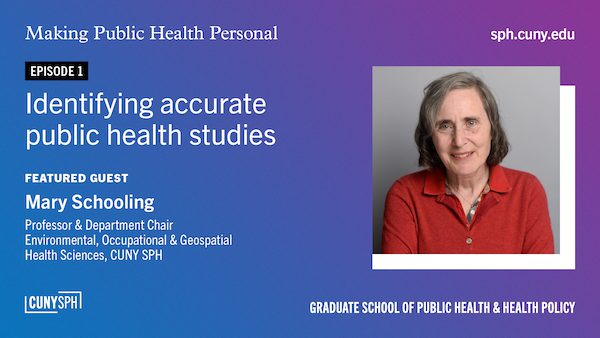
The inaugural episode of Making Public Health Personal examines how to separate legitimate research from clickbait. Host Laura Meoli-Ferrigon is joined by Dr. Mary Schooling, chair of the Department of Environmental, Occupational, and Geospatial Health Sciences at CUNY SPH, who discusses how to understand different types of research studies, and key terms to look for when deciphering good research from sensational headlines.
While it may be convenient, it is also dangerous to rely on quick social media headlines or secondhand information when making public and personal health decisions. At the same time, medical research studies can seem overwhelmingly complicated and hard to understand, if we can locate them at all. In this episode, we discuss how you don’t need a medical or public health background to learn how to locate, identify, and understand reliable research data and studies. We also discuss the checks and balances the research community has in place to weed out unethical research practices.
Transcript:
Episode Links:
www.Pubmed.gov (Direct source of public health research studies available to all, curated by the National Library of Medicine)
www.Wikipedia.com (Reminder: always check sources on this platform)
www.scholar.google.com (Another direct source of public health research studies available to all)
About Dr. Schooling’s research on salt & cardiovascular disease: https://sph.cuny.edu/life-at-sph/news/2020/10/07/salt-cardiovascular-disease/
Contact & find out more about Dr. Mary Schooling: https://sph.cuny.edu/about/people/faculty/mary-schooling/




